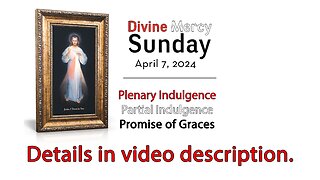Episode 1991: The Cross: Mary and the Journey to Understanding
The Cross: Mary and the Journey to Understanding
We delve into two profound perspectives from the Catholic tradition that offer deep insights into our spiritual journey.
Our first quote comes from St. Rose of Lima, who said, "Apart from the cross, there is no other ladder by which we may get to heaven." This statement encapsulates the essence of Catholic spirituality, emphasizing the centrality of the cross in our salvation. But what does this mean for us in our daily lives?
The cross is not just a symbol of suffering; it is a symbol of love, redemption, and ultimate sacrifice. It reminds us of Christ's profound act of love for humanity. In our own lives, we are called to embrace our crosses, our challenges, and sufferings, and unite them with Christ's sacrifice. Through this union, our sufferings gain redemptive value, and we draw closer to God.
However, embracing the cross doesn't mean seeking out suffering for its own sake. It means accepting the challenges that come our way with faith and trust in God's providence. It means finding meaning in our struggles and allowing them to transform us into better versions of ourselves.
Now, let's turn to our second quote from Pope Benedict XVI, which sheds light on the character of Mary, the mother of Jesus. He said, "[Mary] does not remain locked in her initial troubled state at the proximity of God in his angel, but she seeks to understand."
Mary's response to the angel Gabriel's message is a profound example of faith and obedience. Despite her initial confusion and fear, she seeks to understand the will of God. She doesn't passively accept the message; rather, she engages with it, seeking clarity and discernment.
Pope Benedict XVI portrays Mary as a fearless woman, composed even in the face of the unprecedented. She embodies great interiority, holding heart and mind in harmony as she seeks to understand God's message fully.
In Mary, we find an image of the Church itself – contemplative, seeking to understand the word of God in its entirety, and faithfully preserving the teachings handed down to us.
So, what can we learn from these perspectives? First, the cross is not just a symbol of suffering but also of love and redemption. By embracing our crosses, we draw closer to God and participate in Christ's saving work. Second, Mary's example teaches us to engage with God's word with openness and humility, seeking to understand its full significance in our lives.
Now let me finish up with a scripture verse.
"Teach me thy way, O Lord, that I may walk in thy truth; unite my heart to fear thy name. I give thanks to thee, O Lord my God, with my whole heart, and I will glorify thy name for ever. For great is thy steadfast love toward me; thou hast delivered my soul from the depths of Sheol."
–Psalm 86:11-13
Let's break down the verse and explore its significance:
"Teach me thy way, O Lord, that I may walk in thy truth; unite my heart to fear thy name."
This verse reflects a profound desire for guidance and wisdom from God. It acknowledges God as the ultimate source of truth and seeks to align one's life with His will. The phrase "unite my heart to fear thy name" speaks to the importance of inner harmony and reverence for God. In Catholic tradition, fearing the name of the Lord doesn't imply terror but rather a profound respect and awe for His majesty and holiness. It's a plea for integrity of heart, where one's inner disposition is in alignment with a reverential fear of God.
"I give thanks to thee, O Lord my God, with my whole heart, and I will glorify thy name for ever."
Here, the psalmist expresses gratitude and praise to God with complete sincerity and devotion. In traditional Catholic spirituality, offering thanks and praise to God is fundamental. Gratitude is seen as an acknowledgment of God's goodness and a recognition of His sovereignty over all things. By giving thanks with the whole heart, one acknowledges God's providence and expresses dependence on Him alone.
"For great is thy steadfast love toward me; thou hast delivered my soul from the depths of Sheol."
This verse highlights God's unfailing love and mercy. In Catholic theology, God's love is understood as steadfast and enduring, transcending human understanding. The reference to being delivered from the depths of Sheol (the Hebrew underworld) signifies God's power to rescue the soul from spiritual death and separation from Him. It underscores the belief in God as the source of salvation and redemption, offering hope even in the face of despair.
Psalm 86:11-13 emphasizes the importance of seeking God's guidance, offering heartfelt gratitude and praise, and trusting in His steadfast love and mercy. It reflects the essence of Catholic spirituality, which is rooted in a deep relationship with God characterized by humility, reverence, and trust.
Just as the Psalmist seeks to walk in God's truth, St. Rose reminds us that embracing the cross is essential for our spiritual journey. It is through the cross that we learn to unite our hearts to fear the name of the Lord – to reverence and honor Him in all things.
Furthermore, Pope Benedict XVI's reflection on Mary provides us with a model of how to approach God's truth with humility and openness. Mary's response to the angel Gabriel's message exemplifies a fearless pursuit of understanding and a deep reverence for God's will.
Like Mary, we are called to engage with God's word with our whole hearts, seeking to comprehend its significance and allowing it to transform us. We are invited to ponder the mysteries of faith, trusting in God's steadfast love and providence.
Thank you for joining me today. I hope you found this episode insightful and inspiring. may God bless you abundantly during this holiest of weeks in the year. Now go out and convert somebody, you still have time.
-
 38:30
38:30
CatholicReboot
2 months agoEpisode 1982: Embracing the Cross: Lessons from Mary and the Good Thief
154 -
 33:57
33:57
CatholicReboot
2 months agoEpisode 2008: On the Cross: Mother Behold the Son - Part 18
99 -
 1:21:14
1:21:14
Handinhandwithgodtv
26 days ago10 Questions with Mike Winger (Episode 13)
4 -
 7:37
7:37
Biblical Insights 360
2 months agoLessons in Faith and Miracles: A Journey Through Mark 6
20 -
 5:51
5:51
Biblical Insights 360
2 months agoMiracles and Faith: Exploring Mark Chapter 5
11 -
 8:15
8:15
Jesus' Love Letters ... Liebesbriefe
2 months agoRhema March 26, 2024 🎺 The Passion of the Messiah… Do this in Remembrance of Me, sit at My Table
33 -
 5:39
5:39
Christian Testimonials, Bible Scriptures and Commentary
1 month agoWay of Salvation Come to the Cross of Christ
571 -
 18:30
18:30
Our Lady's Chapel
1 month ago $0.07 earnedDivine Mercy (2nd SUNDAY of EASTER) - April 7, 2024 - HOMILY
24 -
 7:42
7:42
America Needs Fatima
1 day agoMiracle of Our Lady of Perpetual Help
13 -
 25:35
25:35
TruthReigns5
1 month agoThe Study Companion to the Keys of the Kingdom Bible, Intro (part 1)
46